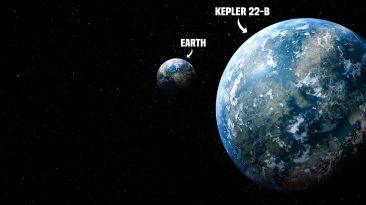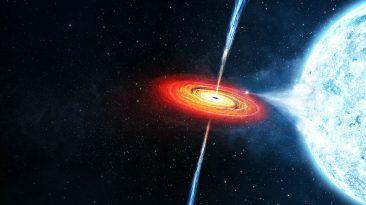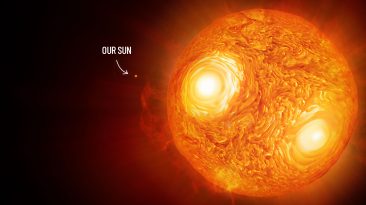It might be the worst date on your weekly calendar, but it’s a date that you definitely don’t want to stand up. Garbage Day.
You tie it all up into neat, plastic bags, haul it outside, and, like magic, your home smells fresh again, and that makes you happy.
Yes, we believe in the “magical world of trash”; out of sight, out of mind. Did you know that world produces 1.2 billion tonnes of waste every year?
By the year 2100, the world will be producing 3.6 billion tonnes of waste. How much longer can we rely on landfills?
What if we need more… space? How much would it cost?
What kind of infrastructure would we need? What could go wrong?
We’ve got a lot of junk on this planet, and it’s only getting worse. So shooting our trash into space sounds like an easy, obvious solution.
After all, we’ve been going into space since the 1950s, surely now it’s easier than ever. Yeah, it’s possible. We can shoot our garbage into space. But it certainly wouldn’t be easy.
The operation would be astronomically expensive, requiring millions of rocket launches every year; which would not only be damaging to the global environment but could also hinder future space travel.
And all of this is assuming that things go according to plan. Since the start of the space age, 5,038 rockets have been launched into space. We’ve sent probes as far as Neptune, and in 2018, NASA sent a probe on a course to the outer atmosphere of the sun.
So, in theory, the solar system is at our disposal for our disposal. But how would it work?
An Ariane 5 rocket carries a payload of up to 7000 kg (15,432 pounds) to a stable point in Earth’s orbit. It can do this at a cost of around $200 million.
But since the world produces 1.2 trillion kg (2.6 trillion pounds) of trash per year, we’d need to launch about 168 million Ariane 5s every year to keep the globe garbage-free.
And all this would cost, oh, only about $33 quadrillion per year. We’ll all have to tighten our belts if we want to make this work. Since worldwide GDP is $77 trillion, we’re a bit short.
But we’re not just short on cash, we’re short on resources. 91 orbital rockets were launched in 2017, which might sound like a lot, but it’s nothing compared to the 168 million launches we’d have to accommodate.
The bottom line: if we want to send our garbage into the cosmos, we need to start building a lot more spaceports, a lot more launch pads, and we’ve got to do it fast.
But suppose we somehow found a way to supply the infrastructure and foot the bill. There are some things we just can’t control.
Russia’s Soyuz space launch system is the most successful of all-time. Its success rate is a stunning 97% for every 1000 launches. Now apply those odds to 170 million launches, when each rocket is carrying more than 7000 kg (15,000 lbs) of garbage. That 3% failure rate isn’t so reassuring anymore, is it?
A few freak accidents a year could have a devastating impact on our atmosphere, our oceans, and our soil.
Not to mention the fatalities and damages that we’d incur when burning plastics and heavy metals are raining from the sky. And what if a failed rocket was carrying nuclear waste into space?
What if accidents and emissions from this space waste program made our world uninhabitable? Would we be beyond saving?
In 1978, NASA scientist Donald J. Kessler theorized that the accumulation of space debris over time could become so dense, that we could no longer use satellites, or for that matter, leave Earth’s orbit.
We would be trapped in a toxic world, surrounded by our own garbage, and we’d decay as well. We don’t like to think about where our garbage goes, we’re just glad to see it disappear.
But of course, we can’t really make it disappear. And we can’t just shoot it into space and hope it floats away.
Because what if it comes back? What would that look like?
Sources
- “Why We Can’t Just Throw Our Garbage Into The Sun”. Wenz, John, 2016. Popular Mechanics. Accessed January 22 2019.
- “Why Can’t We Launch Garbage Into Space? – Universe Today”. Fraser, Cain, 2009. Universe Today. Accessed January 22 2019.
- “”Hey Bill Nye, Should We Throw Our Trash Into Space?””. 2019. Youtube. Accessed January 22 2019.
- “Ask Ethan: Why Don’T We Shoot Earth’S Garbage Into The Sun?”. 2016. Medium. Accessed January 22 2019.
- “Why Don’T We Shoot Garbage Into The Sun?”. 2019. bbc.com. Accessed January 22 2019.
- “How To Stop Humans From Filling The World With Trash”. Semuels, Alana. 2015. The Atlantic. Accessed January 22 2019.
- >“Nasa Parker Solar Probe: Just How Close Can We Get To The Sun?”. 2017. International Business Times UK. Accessed January 22 2019.




























What if we could dig a hole into the earths core and melt our garbage 🤔